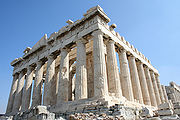


Greece was the first area in Europe where advanced early civilizations emerged, beginning with the Minoan civilization in Crete and then the Mycenean civilization on the mainland. Later, city-states emerged across the Greek peninsula and spread to the shores of Black Sea, South Italy and Asia Minor reaching great levels of prosperity that resulted in an unprecedented cultural boom, expressed in architecture, drama, science and philosophy, and nurtured in Athens under a democratic environment. Athens and Sparta led the way in repelling the Persian Empire in a series of battles. Both were later overshadowed by Thebes and eventually Macedon, with the latter under the guidance of Alexander the Great uniting and leading the Greek world to victory over the Persians, to presage the Hellenistic era, itself brought only partially to a close two centuries later with the establishment of Roman rule over Greek lands in 146 BC. Many Greeks migrated to Alexandria, Antioch, Seleucia and the many other new Hellenistic cities in Asia and Africa founded in Alexander's wake.
The subsequent mixture of Roman and Hellenic cultures took form in the establishment of the Byzantine Empire in 330 AD around Constantinople. Byzantium remained a major cultural and military power for the next 1,123 years, until the Fall of Constantinople to the Ottoman Turks in 1453. On the eve of the Ottoman conquest, much of the Greek intelligentsia migrated to Italy and other parts of Europe not under Ottoman rule, playing a significant role in the Renaissance through the transmission of ancient Greek works to Western Europe.[15] Nevertheless, the Ottoman millet system contributed to the cohesion of the Orthodox Greeks by segregating the various peoples within the empire based on religion, as the latter played an integral role in the formation of modern Greek identity.
After the Greek War of Independence, successfully waged against the Ottoman Empire from 1821 to 1829, the nascent Greek state was finally recognized under the London Protocol. In 1827, Ioannis Kapodistrias, from Ionian Islands, was chosen as the first governor of the new Republic. However, following his assassination, the Great Powers installed a monarchy under Otto, of the Bavarian House of Wittelsbach. In 1843, an uprising forced the King to grant a constitution and a representative assembly. Due to his unimpaired authoritarian rule, he was eventually dethroned in 1863 and replaced by Prince Vilhelm (William) of Denmark, who took the name George I and brought with him the Ionian Islands as a coronation gift from Britain. In 1877, Charilaos Trikoupis, who is attributed with the significant improvement of the country's infrastructure, curbed the power of the monarchy to interfere in the assembly by issuing the rule of vote of confidence to any potential prime minister.
As a result of the Balkan Wars, Greece successfully increased the extent of her territory and population, a challenging context both socially and economically. In the following years, the struggle between King Constantine I and charismatic Prime Minister Eleftherios Venizelos over the country's foreign policy on the eve of World War I dominated the country's political scene, and divided the country into two opposed groups.
In the aftermath of WWI, Greece fought against Turkish nationalists led by Mustafa Kemal, a war which resulted in a massive population exchange between the two countries under the Treaty of Lausanne.[16] According to various sources, several hundred thousand Pontic Greeks died during this period. Instability and successive coups d'état marked the following era, which was overshadowed by the massive task of incorporating 1.5 million Greek refugees from Asia Minor into Greek society. The Greek population in Istanbul had shrunk from 300,000 at the turn of the century to around 3,000 in the city today. On 28 October 1940 Fascist Italy demanded the surrender of Greece, but Greek dictator Ioannis Metaxas refused and in the following Greco-Italian War, Greece repelled Italian forces into Albania, giving the Allies their first victory over Axis forces on land. The country would eventually fall to urgently dispatched German forces during the Battle of Greece. The German occupiers nevertheless met serious challenges from the Greek Resistance. Over 100,000 civilians died from starvation during the winter of 1941–42. In 1943 virtually the entire Jewish population was deported to Nazi extermination camps.
After liberation, Greece experienced a bitter civil war between communist and anticommunist forces, which led to economic devastation and severe social tensions between rightists and largely communist leftists for the next 30 years. The next 20 years were characterized by marginalisation of the left in the political and social spheres but also by rapid economic growth, propelled in part by the Marshall Plan.
King Constantine's dismissal of George Papandreou's centrist government in July 1965 prompted a prolonged period of political turbulence which culminated in a coup d'état on 21 April 1967 by the United States-backed Regime of the Colonels. The brutal suppression of the Athens Polytechnic uprising on 17 November 1973 sent shockwaves through the regime, and a counter-coup established Brigadier Dimitrios Ioannidis as dictator. On 20 July 1974, as Turkey invaded the island of Cyprus, the regime collapsed.
Former premier Konstantinos Karamanlis was invited back from Paris where he had lived in self-exile since 1963, marking the beginning of the Metapolitefsi era. On the 14 August 1974 Greek forces withdrew from the integrated military structure of NATO in protest at the Turkish occupation of northern Cyprus.[22][23] The first multiparty elections since 1964 were held on the first anniversary of the Polytechnic uprising. A democratic and republican constitution was promulgated on 11 June 1975 following a referendum which abolished the monarchy. Meanwhile, Andreas Papandreou founded the Panhellenic Socialist Movement (PASOK) in response to Karamanlis's conservative New Democracy party, with the two political formations alternating in government ever since. Greece rejoined NATO in 1980. Traditionally strained relations with neighbouring Turkey improved when successive earthquakes hit both nations in 1999, leading to the lifting of the Greek veto against Turkey's bid for EU membership.
Greece became the tenth member of the European Communities (subsequently subsumed by the European Union) on 1 January 1981, ushering in a period of remarkable and sustained economic growth. Widespread investments in industrial enterprises and heavy infrastructure, as well as funds from the European Union and growing revenues from tourism, shipping and a fast-growing service sector have raised the country's standard of living to unprecedented levels. The country adopted the Euro in 2001 and successfully hosted the 2004 Olympic Games in Athens.


No comments:
Post a Comment